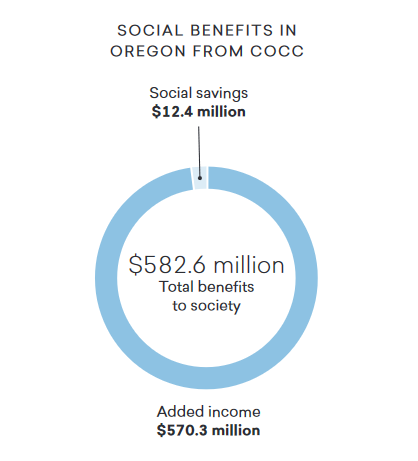Fredrik Finney-Jordet/The Broadside
Central Oregon Community College had a total impact of $298.9 million on the Central Oregon economy during the fiscal year 2018-19, according to a study recently published by Emsi, an economic modeling firm. The study also found that COCC supported 4,166 jobs in the region and that students see an average 18.5% annual return through financial benefits on the cost of taking classes at COCC.
According to the study, titled “The Economic Value of Central Oregon Community College,” the college paid $46.2 million in payroll, which was then spent in Central Oregon by employees. It spent $18.7 million on facilities, supplies, and professional services. According to the study, the college’s operations spending added $57.4 million to the region, including, “the college’s payroll, the multiplier effects generated by the in-region spending of the college and its employees, and a downward adjustment to account for funding that the college received from regional sources.”
The college also attracted 8% of its students from outside Central Oregon, with some relocating to attend. These students then spent money in the region, adding $22.1 million in income for the regional economy.
Altogether, COCC added $298.9 million to the economy in Central Oregon. “One out of every 35 jobs in the COCC District is supported by the activities of COCC and its students,” said the study, referring to Central Oregon.
Of the jobs that COCC supports, 756 are retail trade, and 444 are health care and social assistance. Most of the rest are real estate, food services, accommodation, and other services. The college employed 530 employees during the fiscal year, all of whom lived in Central Oregon, and supported 4,166 jobs throughout Central Oregon.
According to the study, over 15,000 students were served by COCC during the fiscal 2018-19 season. Together, they spent $39.3 million on their education, including expenses and the time and work put into college. Because of their education, those students will earn more money in the job market—on average, a COCC associate degree graduate earns $8,000 more annually than someone with only a high school diploma.
In total, students of COCC during the studied year will receive $114.1 million higher earnings over their working careers. In other terms, the financial investment of going to COCC has an average return of 18.5%, which, the study notes, is greatly higher than a stock market return and than the interest on a savings account.
Taxpayers pay an investment too, in the form of the public funds that go to COCC. Due to the extra money that COCC graduates will contribute to the economy, that investment has a high return. As the study states: “[for] every dollar of public money invested in COCC, taxpayers will receive a cumulative value of $2.00 throughout the students’ working lives.
The study states that it is based on data from COCC, the U.S. Bureau of Labor Statistics, the U.S. Census Bureau, public surveys, and custom economic models. The executive summary of the study is available on COCC’s website.








